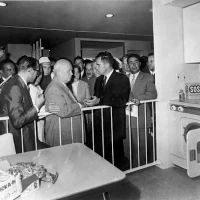The United States and Cuba officially severed diplomatic relations on January 3, 1961, the culmination of months of increasingly hostile bilateral relations. Fidel Castro had seized power in early 1959; relations between Cuba and the U.S. deteriorated rapidly as Cuba nationalized American and other foreign property and companies. The U.S. began to cut back trade with Cuba,… Read More "Turning Out the Lights at U.S. Embassy Havana, 1961"
The Coup Against Iran’s Mohammad Mossadegh
Mohammad Mossadegh became Prime Minister of Iran in 1951 and was hugely popular for taking a stand against the Anglo-Iranian Oil Company, a British-owned oil company that had made huge profits while paying Iran only 16% of its profits and often far less. His nationalization efforts led the British government to begin planning to remove him… Read More "The Coup Against Iran’s Mohammad Mossadegh"
Contempt with a Capital Tea
Oftentimes, high-level diplomatic exchanges are not characterized by the usual diplomatic niceties. Take, for example, a memorable meeting between Indian Foreign Minister Krishna Menon and Secretary of State John Foster Dulles. The setting was the 1954 Geneva Conference, which ultimately passed the Geneva Accords, dividing French Indochina into Laos, Cambodia, and Vietnam. Menon was a talented diplomat… Read More "Contempt with a Capital Tea"
It was undoubtedly one of the most unorthodox – and therefore memorable – settings for a major political debate. On July 24th, 1959, the United States opened the American National Exhibition at Sokolniki Park in Moscow. The Soviets and Americans had agreed to hold exhibits in each other’s countries as a cultural exchange to promote… Read More "Nixon vs. Khrushchev — The 1959 Kitchen Debate"
Sound and the Fury — The 1954 Geneva Conference on Vietnam and Korea
In April 1954, amidst growing tensions regarding the situation in the Korean Peninsula and Indochina, the international community convened a conference in Geneva in the hopes of reaching some sort of accord. The United States, United Kingdom, France, Soviet Union, and People’s Republic of China were the primary negotiators, each jockeying to achieve their objectives… Read More "Sound and the Fury — The 1954 Geneva Conference on Vietnam and Korea"
The Longest Day — Tales from D-Day, 1944
The June 6, 1944 invasion of Normandy marked the beginning of the end of World War II. Planning for what would be the largest seaborne invasion in history began in 1943. In the months leading up to the invasion, the Allies conducted substantial disinformation regarding the date and location of the main landings in order to mislead the… Read More "The Longest Day — Tales from D-Day, 1944"
Not-So Full Disclosure
So you have been entrusted with a very important mission — in this case, trying to convince several countries in the 1950’s to allow take-off and landing of a new, super-secret aircraft, the U-2, which would allow the U.S. to conduct surveillance over the USSR at such a high altitude that Soviet MiG-17s would be… Read More "Not-So Full Disclosure"
The Fall of Dien Bien Phu and the Rise of U.S. Involvement in Vietnam
Dien Bien Phu was a major battle of the first Indochina war in which the French fought against the Viet Minh communists. The French objective had been to support the soldiers at Dien Bien Phu, deep in the hills of northwestern Vietnam to cut off Viet Minh supply lines into neighboring Laos. The Viet Minh, however, were able… Read More "The Fall of Dien Bien Phu and the Rise of U.S. Involvement in Vietnam"
Castro’s Cuba – The Early Days
On January 1, 1959, after a sustained armed revolt led by Fidel Castro and others took control over most of the country, Fulgencio Batista fled Havana, marking the end of one era and the beginning of another. With the departure of the despised dictator, there was initially hope that life in Cuba would improve. William… Read More "Castro’s Cuba – The Early Days"
Khrushchev Visits America – A Cold War Comedy of Errors, Act II
In September of 1959, Soviet leader Nikita Khrushchev visited the United States on an unprecedented goodwill trip spanning several days, thousands of miles and which was covered by a huge press corps. In stark contrast to the finely orchestrated tours and campaign stops that are common nowadays, the visit was a series of flubs and… Read More "Khrushchev Visits America – A Cold War Comedy of Errors, Act II"

